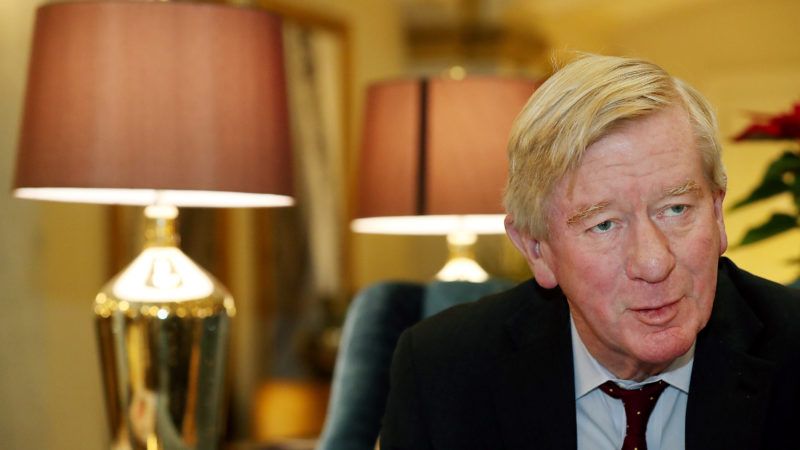Donald Trump Stomps Bill Weld and Joe Walsh in Iowa
The president's would-be primary challengers fail to reach 2 percent, and are being out-fundraised a combined 230 to 1.

It won't get much media attention, but there was a Republican presidential caucus in Iowa tonight, too, and it was as dramatic as it was predictable: President Donald Trump absolutely clobbered primary opponents Bill Weld and Joe Walsh.
The most persistently unpopular president since the end of World War II was at a Castro-like 97 percent of the vote with 79 percent of precincts reporting, while Weld and Walsh were at 1.3 percent and 1.2 percent, respectively. This race has never been close, but man, that's not close.
Weld, a former Republican National Convention keynoter and twice-elected governor of Massachusetts who ran in 2016 as the vice presidential nominee of the Libertarian Party, stressed in his closing argument to Iowa voters his limited-government bonafides.
"I'm running to offer the opportunity to elect a president who actually believes in the principles of limited government, free and fair markets, and economic opportunity for all. Principles that, until recently, were the trademarks of a great political party," Weld wrote. "I don't believe trillion-dollar deficits are okay. I believe in markets, not trade wars….We believe in the Rule of Law, and that it applies to everyone, including the President. We believe the Constitution means what it says, rather than scoffing at its limits on the power of presidents and the federal government. And we believe the purpose of foreign policy and our military is to make us safer."
Walsh, who served one term in the House from nearby Illinois as a Tea Partier and then transitioned to (and then out of) conservative talk radio, has been emphasizing the president's poor character, though he also foregrounds issues such as free trade, spending cuts, gun rights, and criminal justice reform. "If you want four more years of a president who wakes up every morning and makes every day about himself," Walsh said in Ankeny, Iowa today, "then vote for Donald Trump." The crowd booed him out of the room.
There is no demonstrated market for limited-government opposition to Trump within the modern GOP. Trump's approval rating among Republicans, as measured every couple of weeks by Gallup, has not dipped below 87 percent since December 2018. He's been up by more than 80 percentage points among GOP primary voters in national polls for most of the race.
The fundraising numbers for the challengers are, if anything, even worse. Fourth quarter campaign finance results were announced at the end of January, and they were brutal: $411,000 for Weld, $245,000 for Walsh, $45.98 million for Trump. Add the $72.3 million raised in the last three months of 2019 by the Republican National Committee—which, remember, effected an unprecedented merger with the Trump campaign in December 2018—plus a couple of other big-money operations, and the incumbent is outraising the competition combined by a ratio of more than 230 to 1.
Weld and Walsh combined failed to raise as much in the 4th quarter as Steve Bullock, John Delaney, Michael Bennet, Marianne Williamson, Deval Patrick, Beto O'Rourke, and several other Democratic presidential candidates, many of whom have dropped out.
Worse even still, the ankle-biters have been spending what funds they raise, which means that the results they produced tonight, and whatever they gin up in New Hampshire next week, represent something close to maximum effort. Weld had just $37,000 in the bank at the end of 2019, Walsh just under $10,000, compared to Trump's war chest of $195 million. And the Trump-run GOP has been canceling primaries across the country.
Weld is more competitive in New Hampshire, where he owns one home and is close to his base of operations in Boston. He is hoping for a Pat Buchanan-style 1992 surprise, but runs the risk of having a 1972 Pete McCloskey loss as a best-case scenario.


Show Comments (47)